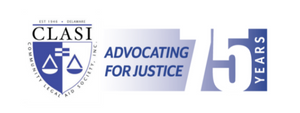FOR IMMEDIATE RELEASE: May 7, 2024
CONTACT: Margaretta Kroeger, CLASI Communications Director, mkroeger@declasi.org
CLASI and The Arc of Delaware File Amicus Brief Supporting Early Voting and Absentee Voting Laws
Disability Rights Organizations Urge Delaware Supreme Court to Reverse Lower Court Ruling That Disproportionately Burdens Voters with Disabilities
WILMINGTON, DE — Community Legal Aid Society, Inc. (“CLASI”), Delaware’s designated Protection and Advocacy agency for people with disabilities, announced today that it has filed an amicus brief with the Supreme Court of Delaware in a case that threatens to significantly limit the ability of tens of thousands of Delawareans with disabilities to vote in the state’s elections.
CLASI’s Disabilities Law Program provides free civil legal services to people with disabilities statewide and advocates for their legal rights. They filed the amicus brief along with The Arc of Delaware, a non-profit organization that promotes and protects the civil rights of people with intellectual and developmental disabilities, through pro bono counsel with the law firm of Young Conaway Stargatt & Taylor, LLP.
CLASI and The Arc urge the Delaware Supreme Court to reverse the Superior Court’s ruling in Mennella v. Albence, which struck down Delaware’s early voting and permanent absentee voting laws. A significant portion of Delaware voters with disabilities depend on these important processes to vote, because they remove many of the barriers that they traditionally face such as: difficulty physically accessing polling sites, lack of accessible transportation, and difficulty completing forms and accessing online processes for absentee ballots.
“CLASI has a longstanding commitment to advocating for the rights of individuals with disabilities and ensuring their equal access to voting,” said CLASI Disabilities Law Program Project Director Marissa Band. “Removing early voting and permanent absentee status would disproportionately affect voters with disabilities who are more likely to rely on these modifications to exercise their fundamental right to vote. Our amicus brief urges the Delaware Supreme Court to uphold these essential voting mechanisms and safeguard the voting rights of Delawareans with disabilities.”
There are more than 200,000 adults with disabilities in Delaware, and a recent nationwide study found that 74% of voters with disabilities voted by mail or via early in-person voting in 2020. Processes such as early voting and permanent absentee voting make it much easier for them to vote and as a result have helped increase participation rates and reduce the “disability turnout gap” where a lower percentage of people with disabilities have historically voted compared to people without disabilities.
The plaintiffs brought the case against the Delaware Department of Elections, arguing that the laws allowing in-person early voting before election day and permanent absentee voting status violated the Delaware Constitution. The Superior Court ruled in their favor, prompting the Department of Elections to appeal the decision to the state’s highest court.
In their amicus brief, CLASI and The Arc argue that the state’s early voting and permanent absentee voting laws are not only constitutional, but also that striking them down would place a disproportionate burden on voters with disabilities. The brief highlights the barriers individuals with disabilities already face in accessing traditional polling places in Delaware, as documented in CLASI’s 2022 General Election Accessibility Report which found widespread violations of the Americans with Disabilities Act (“ADA”) at Delaware polling sites.
If the Superior Court ruling stands, Delaware will be one of only four states (joining Alabama, Mississippi, and New Hampshire) that do not offer early voting. Delaware should remain part of the vast majority of the country—46 states, the District of Columbia, Guam, Puerto Rico, and the Virgin Islands—that recognizes the importance of offering early in-person voting to all voters, and the approximately 20 states that allow multi-year qualification for absentee voting.
CLASI and The Arc’s amicus brief underscores the importance of these alternative voting methods in ensuring the full access and participation of voters with disabilities in the electoral process. In their motion for leave to file the brief, they note that this year’s elections present particularly consequential choices for the nation and for persons with disabilities, and that it is imperative that our elections be inclusive and facilitate voting by people with disabilities so that that their voices will be heard.
The simple fact is that the resolution of this appeal will profoundly affect the ability of persons with disabilities to vote and have significant real-world consequences on the Delaware disability community.
A copy of the amicus brief is available here.
###
About Community Legal Aid Society, Inc. and the Disabilities Law Program:
Founded in 1946, the mission of Community Legal Aid Society, Inc. (“CLASI”) is to combat injustice through creative and persistent civil (non-criminal) legal advocacy on behalf of vulnerable and underserved Delawareans. CLASI provides free legal representation to people with disabilities, people aged 60 or over, people with low incomes, and victims of crime and discrimination to help its clients obtain shelter, government benefits, educational services, medical services, orders of protection from abuse, legal immigration status, and other civil legal remedies.
CLASI’s Disabilities Law Program (“DLP”) provides free legal representation to children and adults with physical and mental disabilities to protect them from abuse and neglect and to advocate for their legal rights. The DLP is designated by the Governor as Delaware’s Protection and Advocacy system for people with disabilities (“P&A”). The Protection and Advocacy for Voting Access (“PAVA”) project within the DLP works to ensure full and effective participation in the electoral process for individuals with disabilities. To learn more about the DLP and PAVA program, please visit: https://www.declasi.org/disabilities-law-program/
CLASI has offices in Wilmington, Dover, and Georgetown, Delaware. To learn more about our work, please visit: https://www.declasi.org/
About The Arc of Delaware:
The Arc of Delaware is an affiliated chapter of the Arc of the United States, the largest national community-based organization of and for people with intellectual and developmental disabilities. The Arc advocates for policies, services, and funding to promote and protect the civil rights of Delawareans with intellectual and developmental disabilities. To learn more, please visit: https://thearcofdelaware.org/
